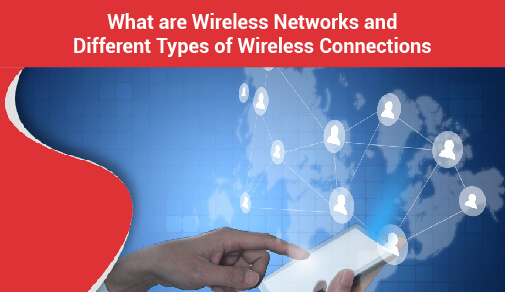What Are Wireless Networks? Explore Types of Wireless Connections
-
149
-
08 Jun 2024
-
4 minutes

Wireless networks have become an essential part of our daily lives, allowing us to stay connected to the internet without the hassle of cords and cables. In this article, we will dive into the world of wireless networks, the different types of wireless connections, the factors to consider when choosing the best wireless internet provider in India and answering how does wireless internet work?
What are wireless networks?
A wireless network is a type of computer network that uses radio signals instead of physical cables to connect devices. This allows for flexibility and mobility, as users can access the network from anywhere within the range of the wireless signal. Wireless networks are commonly used in homes, offices, and public spaces to provide access to the internet and other online services.
How Does Wifi Network Work?
Wi-Fi, short for Wireless Fidelity, is a technology that allows devices to connect to a wireless network using radio waves. Wi-Fi networks work by transmitting data between devices through a wireless access point, which is typically connected to a wired network. Devices with Wi-Fi capabilities can then connect to the access point to access the internet and other network resources.
Different types of wireless networks
There are many different types of wireless connections, each with its own unique characteristics and applications. Some of the most common types of wireless connections include:
Wi-Fi: Wi-Fi networks are the most common type of wireless network, allowing devices to connect to the internet and other network resources wirelessly.
Bluetooth: Bluetooth is a short-range wireless technology that is commonly used for connecting devices such as smartphones, headphones, and speakers.
Cellular Networks: Cellular networks, such as 4G and 5G, allow mobile devices to connect to the internet through cell towers.
Satellite Networks: Satellite networks use satellites orbiting the Earth to provide internet access in remote locations where traditional wired networks are not available.
Difference between wireless and wired networks
The main difference between wireless and wired networks is the method of connection. Wired networks use physical cables to connect devices, while wireless networks use radio signals. Wireless networks offer more flexibility and mobility, allowing users to access the internet from anywhere within the range of the wireless signal. However, wired networks typically offer faster and more reliable connections compared to wireless networks.
Installation and Setup: Setting up a wired network involves running cables and connecting devices physically, which can be time-consuming and labour-intensive. In contrast, wireless networks are easier to install and require minimal hardware setup. This makes wireless networks a more practical choice for users who prioritise convenience and mobility.
Speed and Reliability: Wired networks typically offer faster data transfer speeds and greater reliability compared to wireless networks. This is because wired connections are not susceptible to interference from other devices or environmental factors. On the other hand, wireless networks may experience signal interference, leading to slower speeds and less consistent performance.
Security: Wired networks are generally considered more secure than wireless networks because data is transmitted through physical cables that are difficult to intercept. Wireless networks, on the other hand, are vulnerable to hacking and unauthorised access if proper security measures are not put in place. Encrypting wireless networks and using strong passwords can help mitigate security risks.
Factors to consider while choosing the best wireless internet provider in India
A lot of people search on google, best wifi service provider near me, and there are several factors to consider to ensure you get the best service for your needs. Some important factors to consider include:
Speed: Consider the speed of the internet connection offered by the provider, as faster speeds will allow for smoother online activities.
Coverage: Check the coverage area of the provider to ensure that you will have a strong and reliable signal in your location.
Price: Compare the prices of different providers to find one that fits within your budget while still offering the services you need.
Customer Service: Consider the customer service and support offered by the provider to ensure that you will receive assistance when needed.
In conclusion, wireless networks have revolutionised the way we stay connected to the internet, offering convenience and flexibility. By understanding the different types of wireless networks available and considering the factors mentioned above, you can choose the best wireless internet provider in India for your needs. Stay connected and enjoy the benefits of wireless technology!






